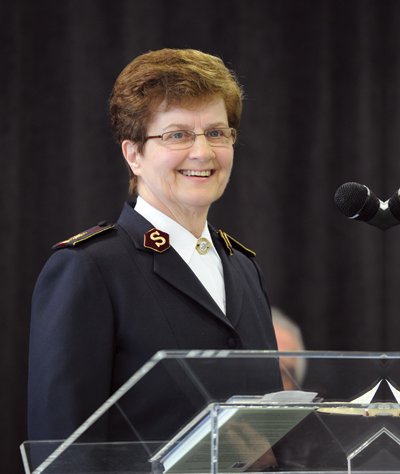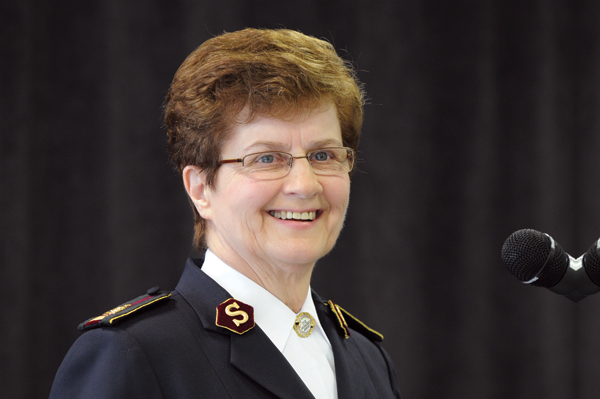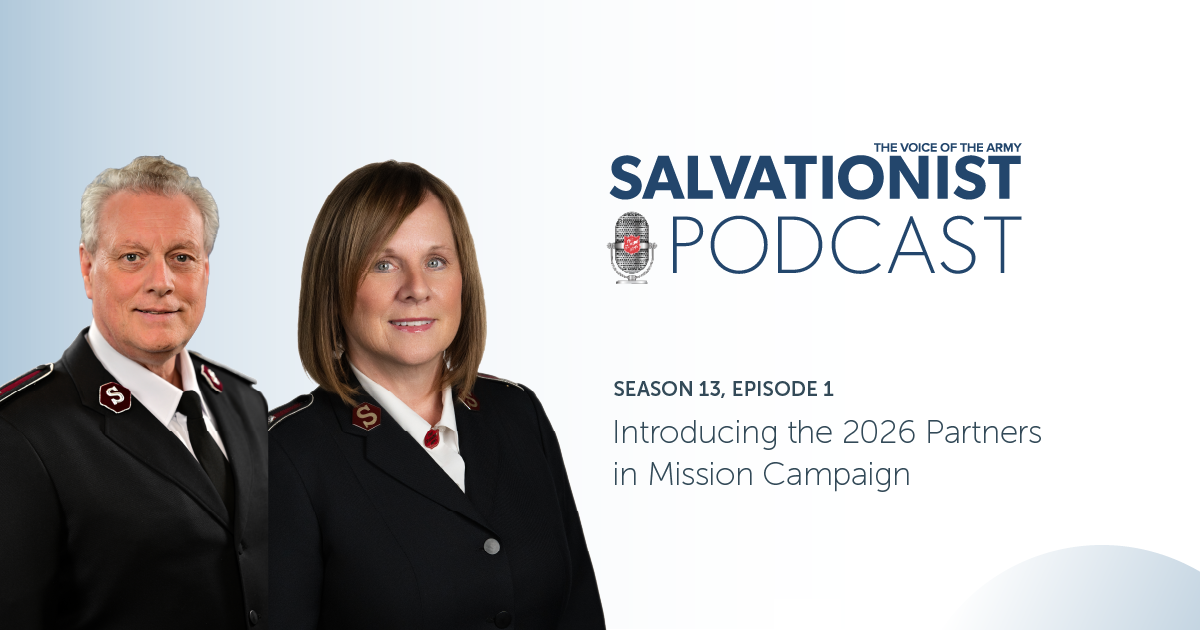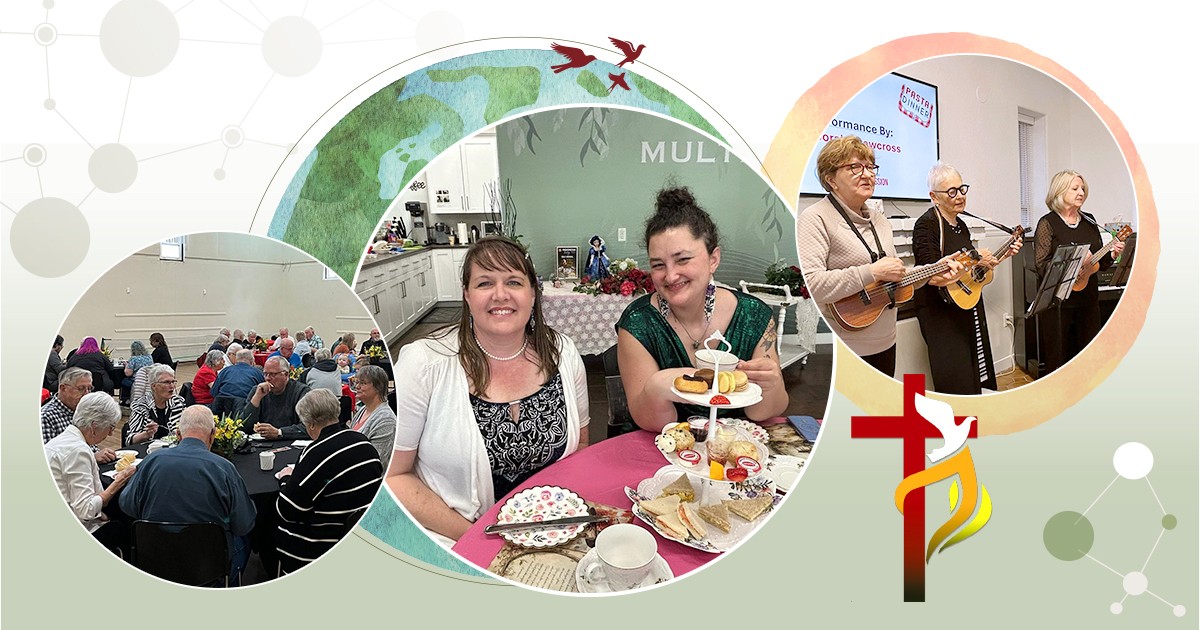
General Linda Bond is the international leader of The Salvation Army. She is visiting Canada this month for the International Conference of Leaders being held in Toronto. General Bond speaks with John McAlister, features editor, about the conference and the state of the Army worldwide.
What three things do you feel embody the spirit of Salvationism?
I believe the salvation truths described in the colours of our Army flag make the great statement of our understanding of salvation. I would also add that our mission-heart—that driving force that moves us beyond our comfort zones and our buildings—is essential to Salvationism. Thirdly, I would add our internationalism.
From your recent travels, please share a couple of inspiring stories of the Army's mission in action.
I was recently in Moldova. The Army in the Eastern Europe Territory is only 20 years old. One of the visits was to the mobile clinic operated by a Salvationist couple who are physicians. They go into very poor villages and enlist the help of specialists who are also Christians. The clinic that day met in an old Soviet building, with long dark hallways. There must have been 200 patients waiting to be seen, all with different ailments, all age groups represented. Before the consultations begin, the doctor reads from the Scriptures, offers a gospel message and prays. Then a team moves out into the neighbourhood for home visits. I went with them through the slippery muddy roads to see a family of children whose parents had died and who could not subsist without the Army's intervention. Then we delivered a wheelchair to an amputee. I felt like I was living in the gospels.
Earlier this year, I was in Nagercoil, India, visiting the Catherine Booth Hospital. The chief medical officer explained to me why they are giving major emphasis to ministry to the HIV/AIDS patients. The state has no provision for orphans so our Army hospital works very hard to secure and provide drugs to give their patients a longer health span to raise their children. The doctor told me that many patients feel so guilty about their disease and leaving their family. He felt their ministry was to introduce them to Jesus, and they have so many who are then able to die in peace.
Why does the Army hold an international conference of leaders?
Because we are one Army, it is vital that periodically leaders get together to consider policy and plans that affect us internationally and that have a direct impact on the Army in each territory and command. While the General, in visits, meets with leaders in the respective territories or commands, the information and stimulation gleaned through international gatherings cannot be underestimated. It is a marvellous opportunity for the sharing of ideas and fellowship as leaders from the different cultures represented meet together. The international conference of leaders is usually held once during the term of office of the General.
Why was Canada chosen for this gathering?
It has been many years since Canada held an international conference of leaders in 1979. Both from an Army and country perspective, Canada offers the infrastructure and organizational skills to plan and host such an event. The Toronto area is so multicultural and I believe Salvationists there will benefit from seeing the leaders of our worldwide Army.
What are the goals and objectives for this international conference of leaders?
The agenda of the conference will be centred on the mission priorities of the One Army, One Mission, One Message theme. There will be major papers given and group discussion on how these relate to specific countries and cultures, and how they need to be carried out in concrete terms. What I expect to come out of the conference is commitment to action. Certain decisions or action steps will need to be taken by International Headquarters (IHQ). Many will need to be the responsibility of the territories or commands.
How do you balance the various needs, cultures and strengths of the many territories and commands?
One of the most valuable assets of our international Army is the degree of co-operation and the sense of mutual understanding. It has always been the case that those rich in resources, whether they be financial, personnel or program, share generously with those who are challenged financially. IHQ is structured by zones. We have the Americas, Africa, South Pacific and East Asia, South Asia and Europe. As well, we have functional departments for administration, personnel, business and program resources. The leaders of these major departments meet with each other on a regular basis and are able to present the needs, strengths and weaknesses in open discussion. Decisions then can be made to bring balance and aid as required.
What inspired you to articulate the One Army, One Mission, One Message vision? What do you hope this vision will do for the international Army?
I believe this expresses succinctly what the Army has been, what we ought to be and do, and what God sees for our future effectiveness. The fact that it has captured the imagination of our Salvationists without me insisting on it just affirms to me that this was of the Lord. It is doing what I hoped and that is giving us a renewed sense of our unity, our identity, our mission and the gospel message.
Tell us about the worldwide Thursday prayer meetings. Why should Salvationists participate?
The worldwide prayer meeting has also made a profound impact on the international Army, more than I could have anticipated. Salvationists should participate because I believe we need to seek the Lord's direction and blessing for the Army. It is perhaps the most vital means of uniting us. Yes, we are internationally organized, share the same doctrines, symbols, distinctives and history, but true unity is the gift of the Spirit and we must seek that above all else. We need the Lord and it is important that together we seek him. He knows why he raised up this Army of his. He knows what plans he has in mind. He knows where he wants us to go and how he sees us ministering in the 21st century. I don't dismiss the strategic plans that are made. Nor do I belittle the gifts and skills we bring to the table. But this is God's Army and we must rely on him for direction, power and fruitfulness. Our worldwide prayer meeting is already held in 121 countries with thousands at prayer. I believe there should be hundreds of thousands meeting together during the 24-hour period on Thursdays (visit Salvationist.ca/worldwideprayer). We have no idea how powerful such united intercession is.
Given the decline of church attendance in the Western world, how can the Army experience significant growth in the future? What is the way forward for the Army?
I do not believe it is our responsibility to grow the Army or to compete with other churches as to attendance numbers. It is God's responsibility to grow the Army, and he will. What we have to do is to be the people we were called to be and do what we were called to do. We must be The Salvation Army, not a pale imitation of another church or a weak expression of ourselves. Neither can we idolize the Army as though it were our salvation. Only the Lord himself is our salvation. Nor can we occupy ourselves with being its worst critics. We must believe that God raised it up and wants it to be a Spirit-filled Army, moving in unity and in mission with the powerful, transforming message of full salvation.
Given the covenantal nature of Salvation Army membership, how do we attract young people who seem hesitant to make lifelong commitments?
At this point in time, athletes from all over the world are in last minute preparations for the Olympics to be held in London, England, in July. They have disciplined themselves and sacrificed time and money for this one great moment in their lives. This is not the time for The Salvation Army to water down its covenants either by time span or lifestyle requirements. Lifetime commitments are being made by young people. Other agencies and forces are calling them to reach for the highest, give their best, sacrifice their lives and find ultimate fulfilment in giving themselves for the greater good. How can we do less? While we want an ever increasing Army in size and quality, we must always remember the story of Gideon. Numbers do not ensure victory. What is needed is obedience to God, holy daring and allegiance to the greatest cause on earth.
How do we maintain our Army distinctives while still allowing for healthy discussions of Army beliefs and practices? What are the non-negotiables? Where can we afford to be flexible?
I believe healthy discussion on our beliefs and practices will always ensure that we hold to our Army distinctives if we truly believe these have come to us because of our faith and mission. The major non-negotiable is our understanding of salvation. Its Trinitarian foundation is held in common with most churches. But we also believe it is a salvation for the whole world. Everyone can be saved. We also believe it is a salvation for the whole person, so that every part of our life and lifestyle is affected. We believe that the Army must minister to the whole person and therefore we do not see ourselves with a divided mission. Wherever the Army flag flies or wherever the crest or shield is to be found, we must see ourselves as a soul-saving, saint-making Army, compelled by Christ to serve suffering humanity, whatever it entails. Our identity and mission, in my mind, are God-given and are non-negotiables. So many of our symbols, slogans, songs and even our structure support our understanding of salvation and how we proclaim it in word, deed and image. We have had lengthy discussion at the Spiritual Life Commission on our sacramental stand and concluded that our position is soundly connected to our holiness doctrine. We see the whole of life as sacramental. The internationalism of the Army must be guarded. We cannot be a federation of states or autonomous churches or local humanitarian organizations. Our essential unity is a gift from the Lord.
Flexibility in methods, uniform, programs and worship styles is one of our strengths. Anyone who has travelled to other parts of the Army world would verify that this is so even though the essential Salvation Army spirit is evident.










Leave a Comment